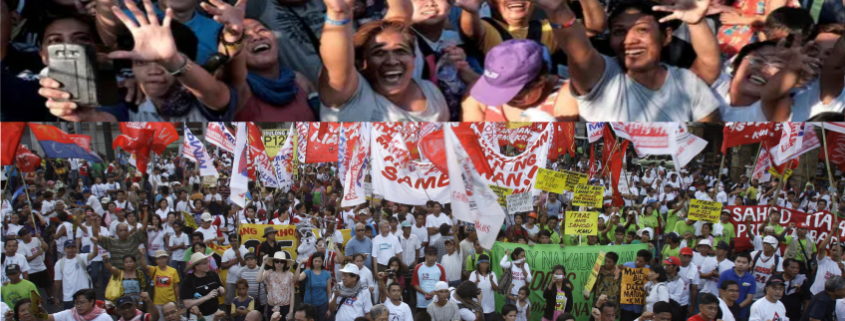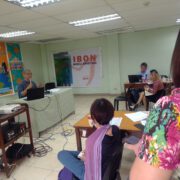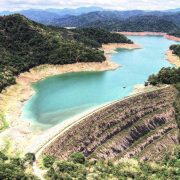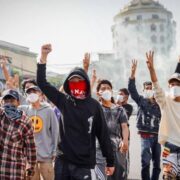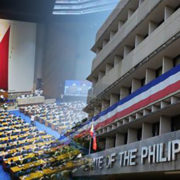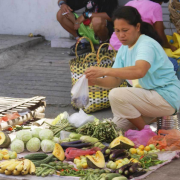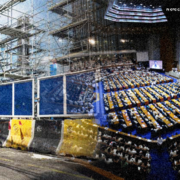Winds of democracy in the Philippines
By Sonny Africa
Delivered at the International People’s Research Network (IPRN) Webinar on “Building People’s Democracy” held on November 27, 2020
What struggles to build a democratic society truly fulfill the aspirations of the people? IBON will briefly share our experience in the Philippine context and look forward to discussions to enrich this from different perspectives. The winds of democracy are blowing strong here.
We can start by affirming the essential character of the Philippine state. It remains as it has always been – political and economic elites inextricably intertwined and using the powers of government to advance their narrow interests. But it may be useful to look at some major developments over the last four decades of neoliberal globalization. This may help clarify authoritarian trends seen today and also point to areas needing particular attention.
Globalization and democracy
The 1980s saw hype about the “end of history” and the supposed triumph of Western liberal democracy with its distinct blend of free markets and private property, civil liberties and human rights, and supposed political freedoms. (Even then, giant China was of course a conveniently disregarded outlier.) Since then, there has been an increase in pluralist electoral democracies enshrining the popular vote for choosing leaders – as in the Philippines upon the fall of the Marcos dictatorship in 1986. (Even Russia started choosing its president by popular vote in 1991.) There has also been a huge expansion in mass media and then the internet which, it was argued, strengthened liberal democracies by democratizing information.
In economic systems, free market policies of neoliberal globalization were promised to unleash economic potential, develop backward economies, and bring prosperity to all. In reality, we’re all familiar with how neoliberal globalization has resulted in greater exploitation, greater destruction of natural resources and the environment, and greater wealth and economic power in the hands of a few. Hundreds of millions or even billions of people exploited, abused and left behind made the rumble underfoot grow stronger as economic crises erupted and deepened.
Elites however twisted this dissatisfaction, went on an all-out disinformation offensive in mass media and the internet, and manipulated elections to rise to power as today’s populist authoritarianisms – the Philippines’ own Pres. Duterte is a case in point. In too many places around the world, demagogues of different degrees are elected and have risen to the top of falsely democratic political systems.
They mostly keep the forms of liberal democratic institutions in place – free elections, the branches of government, mass media, even civil society. But these are wielded self-interestedly, subverted in practice, and any portions particularly inconvenient are carved out. But they are fundamentally authoritarians and we see everywhere the growing use of state violence, against any and all opposition, to protect elite economic interests and to retain political power.
These processes have played out in the Philippines as elsewhere. In our specific circumstances, how do we build a democratic society?
People, most of all
The most critical foundation remains people’s organizations with a vision of a democratic society. The Philippines is fortunate to have a long-standing core of this in the mass movement built up over decades. These include the country’s largest organizations of politicized peasants, formal and informal workers, youth and students, women, indigenous people, teachers and academics, and more.
The mass movement combines concrete struggles on immediate concerns with constant education work on systemic issues. Concrete struggles and constant education are both essential to build solid core constituencies for genuinely transformative change for the better.
These organizations are at the forefront of challenging anti-people social and economic policies and countering neoliberal globalization. They are also an army that reaches out not just to their direct constituencies and networks but also communicates to the widest number of people through mass media, social media, and other internet platforms.
They are supplemented by tactical formations and alliances on urgent issues to more immediately reach out to and mobilize the wider public. For instance, the steady assault of the regime on accustomed liberal democratic institutions creates wide opportunity for this. The attacks on senators, congressional representatives, the Supreme Court chief justice, the Ombudsman, the Commission on Human Rights (CHR), major broadcast and internet media outfits, civil society, activists and others have stirred wide outrage. This scattered dissent needs to be brought together.
Progressives in government
At the same time, people’s organizations have enough strength and flexibility to also directly engage in traditional elite-dominated governance through elected parliamentarians such as via the party-list system in Congress. Progressive party-list groups have always been among the frontrunners in Congressional elections and already form a solid pro-people bloc in the House of Representatives.
While fully part of the traditional institutionalized political system, progressive parliamentarians remain solidly grounded in people’s organizations and are relentless in challenging the boundaries of the country’s so-called democracy. As real representatives of and from the people, their legislative measures and political work are consistently biased for the people. They seek to deliver concrete benefits while consistently seeking to weaken the economic power and fight the political abuses of self-serving elites.
Through their visible public service, they enable the general public to see that more democratic economic and political policies are possible. But they are also the beachhead of democracy in the authoritarian Duterte government for launching attacks from within. They are valuable for reaching out to other progressives and potential allies within the government, and for organizing efforts to push for democratic changes in the centers of reactionary politics.
Research matters
The superstructures of power are defended not just by sheer violence but by the hegemony of self-serving and reactionary knowledge. We of course give special attention to the invisible power of ideas, values and beliefs in reproducing capitalism and today’s worsening authoritarianism. Among the most important ways to challenge this is with solid research from the perspective of and upholding the aspirations of the people for social justice, equity, and a decent life for all.
The struggle of ideas is one of the most urgent realms of political struggle. Solid research and tenacious advocacy are vital to overcome the dominance of ruling class ideas and values. More and more people must unlearn that oppression is just to be accepted and that the only improvement in our material conditions is what ruling elites will allow.
Solid research is vital to support the campaigns of people’s organizations and of progressives in government. For instance, research on economic issues reveals what changes decades of imperialist globalization have wrought as well as confirms what remains the same. And we know that ideas are meaningless if not transformed into a political force so these need to be formed with or by the mass movement and then taken up by it.
Solid research is vital to credibly challenge anti-people policies and to articulate our new ideas and visions for a more just and democratic society. We challenge capitalism not just because it is exploitative and oppressive but also because it isn’t immutable, can be replaced, and should be replaced. We look to the socialist alternative not just because we imagine it as just, humane and liberating, but also because it is possible and can already start to be built. Research makes our critique potent and also makes our alternative real.
Research is about ideas and we are today facing a deluge. What does it take to be dynamic in the digital age with its endless tsunami of trivialities and information? It isn’t enough that our analysis is correct and that we are credible – to communicate today we have to be real-time, interactive, and nimble with text, photos, graphics, audio, video and animation. And while we will continue to distribute our research, we also have to be ever more accessible not just conceptually but also literally. More than ever, people constantly seek information with a mere click of their finger or a swipe of their thumb.
Democracy in progress
Finally, we all know the value of seeing that oppressive structures can be changed and that what is accepted as ‘normal’ can be replaced. In the Philippines, the most radical flank and most direct challenge to the oppressive status quo are the scattered but growing sites of democratic governance in the countryside. In many rural areas across the country, communities are undertaking examples of how local political and economic democracy can be interlinked to benefit the majority people and not a few elites. These are areas where landlords, agri-business, and mining corporations do not dominate and where people’s organizations have taken control of their communities and their lives. They push the envelope of our democratic struggles.
On a historical scale, there’s no doubt that the world is changing for the better. There’s too much creativity, energy and bravery committed to that for it to be otherwise. Perhaps in fits and starts, or with setbacks big and small – but, still, we’re inexorably moving forward on the back of millions of steps and struggles every day around the world. #

